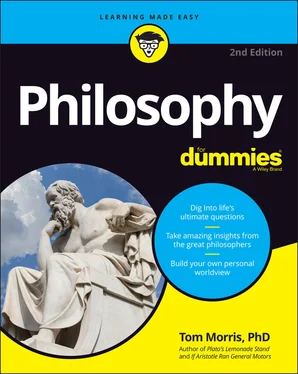Tom Morris - Philosophy For Dummies
Здесь есть возможность читать онлайн «Tom Morris - Philosophy For Dummies» — ознакомительный отрывок электронной книги совершенно бесплатно, а после прочтения отрывка купить полную версию. В некоторых случаях можно слушать аудио, скачать через торрент в формате fb2 и присутствует краткое содержание. Жанр: unrecognised, на английском языке. Описание произведения, (предисловие) а так же отзывы посетителей доступны на портале библиотеки ЛибКат.
- Название:Philosophy For Dummies
- Автор:
- Жанр:
- Год:неизвестен
- ISBN:нет данных
- Рейтинг книги:4 / 5. Голосов: 1
-
Избранное:Добавить в избранное
- Отзывы:
-
Ваша оценка:
- 80
- 1
- 2
- 3
- 4
- 5
Philosophy For Dummies: краткое содержание, описание и аннотация
Предлагаем к чтению аннотацию, описание, краткое содержание или предисловие (зависит от того, что написал сам автор книги «Philosophy For Dummies»). Если вы не нашли необходимую информацию о книге — напишите в комментариях, мы постараемся отыскать её.
Philosophy For Dummies
Philosophy For Dummies
Philosophy For Dummies — читать онлайн ознакомительный отрывок
Ниже представлен текст книги, разбитый по страницам. Система сохранения места последней прочитанной страницы, позволяет с удобством читать онлайн бесплатно книгу «Philosophy For Dummies», без необходимости каждый раз заново искать на чём Вы остановились. Поставьте закладку, и сможете в любой момент перейти на страницу, на которой закончили чтение.
Интервал:
Закладка:
Since the ancient world, philosophers have cautioned about humankind’s natural tendency to claim knowledge where knowledge, in fact, may not exist. The ancient philosophy of skepticism can help you to understand more deeply what exactly knowledge is, and where it comes from, as well as to answer the open question philosophers have often asked of whether evidence is always required for rational belief, and thus for knowledge.
In this chapter, you will see how the most basic form of skeptical inquiry can give a fresh perspective on the foundations of all human knowledge. You’ll be introduced to some fundamental questions you’ve likely never asked, and in the process of trying to answer them, you’ll discover an overlooked principle of rationality. This just may be the most philosophically challenging chapter in the whole book, but if you can grasp its reasoning and its implications, you’ll see all the other issues of philosophy in a new way. The questions that are raised by skepticism can put everything in a new light, and can inspire you with a needed humility and deeper perspective concerning all claims to knowledge.
Introducing the Ancient Art of Doubt
The words skeptic and skepticism come from an ancient Greek verb that meant “to inquire.” Etymologically, then, a skeptic is an inquirer. This should form an important background insight for your understanding of skeptical doubt. Skepticism at its best is not a matter of denial, but of inquiring, seeking, questioning doubt. As long ago as Homer’s Odyssey, we find the striking exclamation: “How prone to doubt, how cautious are the wise!” Wisdom often begins in skeptical questioning, in productive doubt seeking understanding.
The first great skeptical philosopher in the ancient world was Pyrrho of Elis (c. 310–270 BCE). It is said of him that, after traveling with Alexander the Great as a court philosopher, he returned home to teach great crowds of admirers and wisdom seekers. Pyrrho was known for presenting philosophy as a way of life that aims at a calmness of the spirit and happiness of the heart.
This philosopher believed you should always be quick to question and slow to believe. He seemed to think that people too easily can become convinced of things that trouble their minds and disturb their souls. So he practiced and preached withholding judgment, or assent, as much as possible.
Some stories from his time portray Pyrrho as perhaps far too calm, and even indifferent about real dangers in his daily environment. Apparently, his friends were constantly saving his life, pulling him from the paths of speeding carts, from the edges of cliffs, and away from other dangers. Commentators ascribe this to his skeptical disinclination to trust his senses, and thus to a philosophical reluctance to believe anything that appeared to be going on around him. But it’s easy to doubt this, appropriately enough. In graduate school, my best friend and I frequently saved each other’s lives, alternately pulling each other back from the paths of oncoming cars as we walked the streets of New Haven, Connecticut, deep in thought. Our apparent indifference to the dangers around us came about just because we were lost in the intricacies of philosophical reasoning, constructing an argument concerning some abstract issue, and it had nothing to do with the peculiarities of skeptical doubt. Philosophers just tend to get lost in thought, in cities the size of New Haven. Or even Elis.
 Other stories about Pyrrho seem more credible and more likely due to his skepticism. There is a report that when a fierce dog attacked him, he reacted with fear, and then later apologized to his friends for not acting consistently with his own philosophy. Another story clearly represents him as attaining this consistency of withholding judgment and experiencing inner calm as a result. He was on board a ship during a violent storm but showed no fear. His terrified fellow passengers asked how he remained calm. In the midst of the fury nature was unleashing, he pointed to a little pig on deck calmly eating his food and said that this is the unperturbed way a wise man should live in all situations.
Other stories about Pyrrho seem more credible and more likely due to his skepticism. There is a report that when a fierce dog attacked him, he reacted with fear, and then later apologized to his friends for not acting consistently with his own philosophy. Another story clearly represents him as attaining this consistency of withholding judgment and experiencing inner calm as a result. He was on board a ship during a violent storm but showed no fear. His terrified fellow passengers asked how he remained calm. In the midst of the fury nature was unleashing, he pointed to a little pig on deck calmly eating his food and said that this is the unperturbed way a wise man should live in all situations.
The city of Elis exempted all philosophers from taxes in honor of Pyrrho, because of his example and his service to the community. And his fellow thinkers would all have been thrilled at this great news, if they just could have brought themselves to actually believe it.
One other notable ancient skeptic was the physician Sextus Empiricus. Little information about his life survives, but it’s assumed that he was Greek because of his knowledge of the language and of places in the Greek world. His works have been very influential and are the best sources for the arguments and positions of classic Greek skepticism. Like Pyrrho, Sextus was no dogmatic naysayer about human knowledge. He didn’t deny its possibility or actual occurrence. He was just extremely careful about committing belief to anything that went beyond immediate appearances, beyond what seems to be, as distinct from what really is, and he urged others on to similar caution.
Any skeptic who was like Pyrrho and Sextus thought people should live in accordance with appearances, or what their senses seem to indicate, but should refrain from drawing any conclusions from those appearances, or avoid any firm beliefs based on the appearances. The point of this caution was always a goal of calmness of spirit, and ultimately a sort of peaceful happiness in life.
THE DOGMATIC NAYSAYERS
Some curmudgeonly ancient thinkers like Carneades boldly declared that, “Knowledge is impossible.” Others averred, a tad bit more humbly, merely that “Nothing is known.” But what’s the most obvious, embarrassing question you could ask such a person? Right: “How do you know that?” Another related negative position might maintain only that, “No beliefs are rational.” But all these claims are examples of propositions that, in one way or another, are self-defeating or self-undermining. Consider these statements:
No propositions are true.
This sentence is not made up of words.
No, I don’t speak any known language.
All these statements are self-undermining as well. Self-undermining sentences or statements fall into these categories: those that can’t possibly be true; those that can’t be rational to hold; and those that in some way defeat themselves when expressed. They are linguistic curiosities, but not much else.
The skepticism that is consulted and examined here is not self-defeating like some form of dogmatic naysaying. Proper skeptics do not deny. They just hesitate to affirm, and they question the affirmations that everyone else naturally make. The current world of social media, commercial hype, and nonstop political propaganda could use a little more healthy skepticism.
This is the ancient heritage of skepticism. But the use of skeptical questioning in this chapter is a bit different. What you’ll see here isn’t directed toward the attainment of spiritual peace. It’s about intellectual enlightenment. In other parts of the book, you can put this into service with matters of the spirit. (See for example chapters 10- 12, 13- 15, 16- 18and 19- 21.) But for now, the task is merely to probe into the foundations of what normally is considered to be human knowledge. There are some important realizations to be had. You’ll see what Cicero had in mind when he once intimated, “By doubting, we come at the truth.”
Asking Questions We Can’t Answer
The skeptic asks some deep and challenging questions to which there are no quick and easy answers. As a result of studying these questions, you can come to a much deeper understanding of some really fundamental things that most people have long taken for granted.
Читать дальшеИнтервал:
Закладка:
Похожие книги на «Philosophy For Dummies»
Представляем Вашему вниманию похожие книги на «Philosophy For Dummies» списком для выбора. Мы отобрали схожую по названию и смыслу литературу в надежде предоставить читателям больше вариантов отыскать новые, интересные, ещё непрочитанные произведения.
Обсуждение, отзывы о книге «Philosophy For Dummies» и просто собственные мнения читателей. Оставьте ваши комментарии, напишите, что Вы думаете о произведении, его смысле или главных героях. Укажите что конкретно понравилось, а что нет, и почему Вы так считаете.












